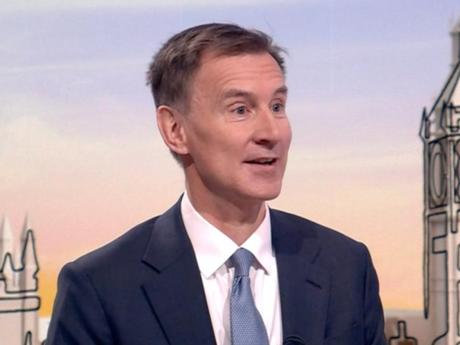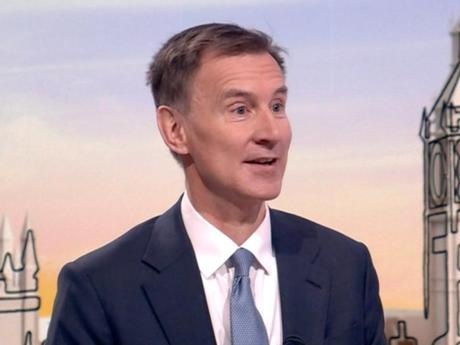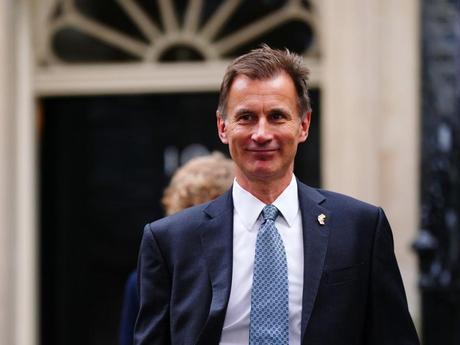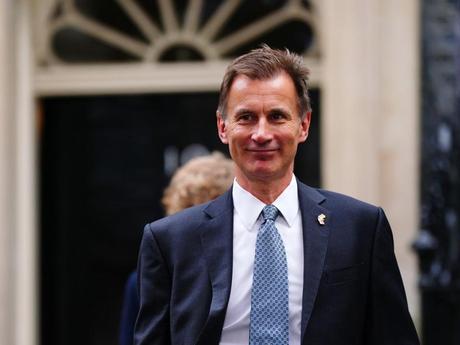The prospect of a shock income tax cut has emerged after Chancellor Jeremy Hunt failed to rule it out.
Mr Hunt said he wanted to put the country on "a path to lower taxes" but would "only do so in a responsible way" as he prepares to unveil his autumn statement on Wednesday.
It was thought the Chancellor would propose a cut in inheritance tax, but a backlash from Conservative MPs in the 'red wall' north of England appears to have prompted a rethink.
Mr Hunt and Mr Sunak have been told that such a decision would be seen as a hand-out to the rich, costing them support votes among the working-class voters who supported the Tories in the 2019 election.
The possibility of an unexpected cut to income tax and national insurance is now being eyed after reports that Mr Hunt and Rishi Sunak are "thinking about it".
If confirmed, it would mark a major change in the government's strategy. They were thought to have planned such tax cuts in the Spring Budget to woo voters ahead of next year's general election.
Millions would benefit more from a reduction in the basic rate of income tax or national insurance than from a cut in inheritance tax. It is also seen by many as a way to undermine Labour's large lead in the polls by forcing Sir Keir Starmer to say whether he will reverse any tax cuts if he comes to power.
An income tax cut would also help Mr Sunak shore up support among right-wing Tory MPs who demanded such action and were furious over his dismissal of Home Secretary Suella Braverman.
However, a tax cut is not without political danger. Many economic experts have said that while the Chancellor will benefit from an increased budgetary headroom of £25 billion - much larger than the previously expected £6.5 billion - it is still too early to risk major tax cuts.


Furthermore, when he replaced Liz Truss in Number 10, Mr Sunak vowed not to repeat her reckless financial dealings, which caused a major economic crisis.
Senior Tory MP John Stevenson, chairman of the Northern Research Group, said The independent: "Inheritance taxes may need reform, but are currently a distraction. Much more important is lowering taxes for low-income people and businesses. That will help the economy move forward."
The story continues
Jonathan Gullis, MP for Stoke-on-Trent North, said that "now is not the time for this [inheritance] tax cut". The right-wing Red Wall MP argued that lowering the basic income tax rate and raising the threshold for the 40 cent rate would help families "really feel the pressure".
John Redwood, the Tory tax cut advocate, described the possibility of an inheritance tax cut as a "strange priority" and said he would prefer to see income tax thresholds. The ex-minister is pushing for cuts in energy taxes, including VAT on domestic bills and carbon taxes paid by businesses.


Mr Hunt gave his strongest hint yet that he was prepared to cut taxes on Wednesday - to Sky's Sunday morning with Trevor Phillips: "We must show that there is a path to an economy with lower taxes."
The Chancellor is said not to be interested in whether he could cut income tax or national insurance, but told the broadcaster that cuts may be needed to reduce taxes. "If you want to reduce personal taxes, the only way to do that sustainably is to spend public money efficiently."
Pressed by the BBC's Laura Kuennsberg over whether he planned to cut income tax, the chancellor declined to comment, saying "our priority is growth". Mr Hunt did not deny that an inheritance tax cut was being considered. "Everything is on the table in an autumn statement," he said.
The Sunday times reported that Mr Hunt and the Prime Minister are now considering cuts to income tax or national insurance in an eleventh move. They are reportedly more focused on nominal income tax rates than thresholds.


Mr Hunt is also under pressure over a planned cut to benefits. Ministers normally use September's figure for inflation when increasing working-age benefits, which would represent a 6.7 percent increase. But Hunt has not ruled out using October's much lower figure of 4.6 per cent, which would mean savings of around £3 billion.
Using the lower rate would impact the incomes of nine million low-income families, according to the Resolution Foundation. New analysis from the think tank shows some families could lose as much as £500 a year.
Cutting inheritance tax - possibly by half - might be popular with some on the Tory right, but would only directly benefit a small section of the public.
A new report from the respected Institute for Fiscal Studies (IFS) says a cut in inheritance tax would deliver an average windfall of £180,000 for millionaires. IFS chief executive Paul Johnson said cutting inheritance tax would be "a very strange statement of priorities".
Only around 4 per cent of deaths in 2020/21 resulted in paying inheritance tax, with exemptions allowing many couples to pass on up to £1million tax-free. Inheritance tax is charged at 40 per cent on estates over £325,000, with an additional £175,000 for a main residence passed on to direct descendants.
However, Tory MP David Jones, vice-chairman of the European Research Group, urged Hunt to focus on cutting inheritance and corporation tax.
"Inheritance tax has a disproportionate impact on the middle class - it is bitterly opposed," he said. The independent. "It would be a strong signal that we would return to Conservative principles if they were completely abolished."
Tory guru and peer Robert Hayward said Hunt would "obviously" announce some form of tax cut - but predicted the chancellor could delay it and delay it for the financial year starting April 2024.
Lord Hayward's announcement of further tax cuts for April 2025 would leave a "bear trap" for Labor - forcing Keir Starmer's party to explain whether it would reverse the cut if it wins the election in the autumn of expected in 2024.
The Tory peer said: "The Chancellor has appeased the moderates in the party, he is now aiming to pacify the other factions. I don't think a reduction in inheritance taxes would be popular with the public. Of all the possible headline cuts, this would be the hardest to sell."
Mr Redwood said there would be a big risk for Mr Hunt if he were to implement deferred tax cuts for 2024 and 2025. "It could be a hostage to fortune because people could try to find reasons why you wouldn't keep your word," he said.
Meanwhile, ex-chancellor Kwasi Kwarteng said Hunt must announce tax cuts - this week or in the spring - to give the Tories any chance at the next general election. "We cannot have an election where we say we are going to raise your taxes indefinitely," he told GB News.
Former Tory minister Priti Patel called on Mr Hunt to "embrace conservative values" and give voters a clear choice by cutting fuel duty, corporation tax and raising income tax thresholds.
Former Conservative minister David Gauke told the BBC that cutting inheritance tax while millions are fighting risked "poisoning the Tory party again". And Labour's shadow chancellor Rachel Reeves told Sky News that cutting inheritance tax seems an "unusual way" to help millions of struggling Britons.
